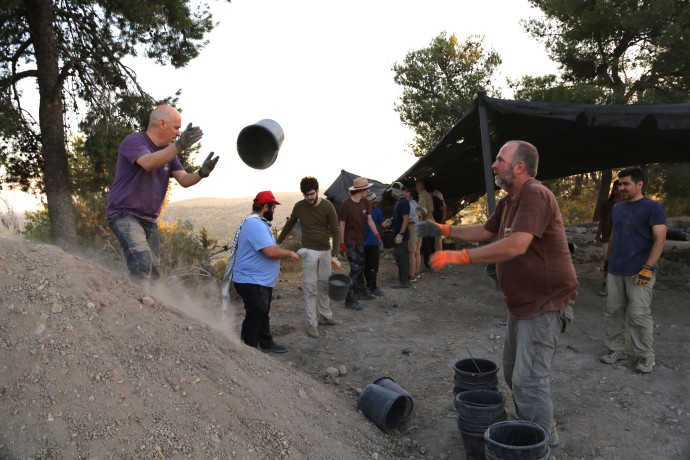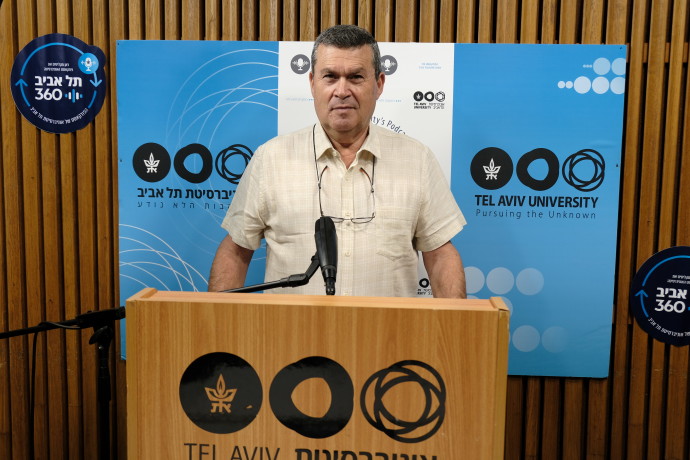‘Since I was a child, I was interested in the ancient history of the Land of Israel,” says Oded Lipschits, professor of Jewish history in the biblical period in the Department of Archaeology and Ancient Near Eastern Cultures at Tel Aviv University. “I remember looking for the ancient origins of Israel and Judaism.”
After completing his IDF service, Lipschits began his university studies at Tel Aviv University, earned his PhD in Jewish history in 1997, and completed his post-doctorate at the Faculty of Theology at Heidelberg University in 2003.
Lipschits has turned his childhood interest in the Bible into a lifelong pursuit of knowledge of the subject as a professor of Jewish history and historian of the biblical period. In addition, he has led archaeological excavations of numerous sites in Israel, such as Ramat Rahel, Tel Azeka, and Tel Moza. “I’m using archaeology and biblical studies to better understand history,” explains Lipschits.

The 60-year-old Lipschits retains his boyish enthusiasm for the Bible, which he has channeled into a popular series of podcasts on the subject, titled The Untold Story of the Kingdom of Judah. The original Hebrew-language podcast attracted an audience of 100,000 listeners in Israel.
The English-language podcast is now available in a 34-part series on popular podcast outlets such as Apple, Spotify, and YouTube, as well as Tel Aviv University’s website (scan the QR code accompanying this article to listen to the podcast). Each English-language podcast is between 45 and 55 minutes. Lipschits quips that people listening to the podcast while working out may need to spend a few extra minutes in the gym to finish an entire episode.
The Untold Story of the Kingdom of Judah focuses on the story of the history of the Kingdom of Judah, as told in the books of Joshua, Judges, Samuel, and Kings, and describes the point of view of the Jerusalem elite of the period – what they knew, what they wanted to tell, and what served their political, religious, and economic interests.

Lipschits says people don’t often consider the significant role played by those who record history. “It took me time to understand that the most important person in history is the historian,” he says. “The people who wrote and shaped history in the way they wanted to shape it are the most important. In the podcast, I’m trying to give the perspective of the people who wrote the history – what they wanted to say, when they did it, and what they actually knew about history.”
The podcast does not take a traditional view of the Bible but adopts a more critical and modern approach to Bible study, Lipschits says. “For the English podcast, my thoughts are first of all for Jews around the world who are interested in the Bible and the history – not from the Orthodox perspective but from the modern, open point of view, and with a very critical modern way to reading the text and dealing with text. I’m thinking about Jews around the world who have the curiosity for the Bible, but I’m not talking about the Torah.”
Ultimately, he thinks that the largest audience for the podcast may come from Christian listeners in the United States and Europe who take a more modern approach to Bible study. Several years ago, Lipschits offered a course on the online learning platform Coursera.comtitled “The Fall and Rise of Jerusalem,” which focused on the end of the First Temple and the destruction of Jerusalem, and attracted many Christian viewers.
In the introductory podcast to the series, Lipschits discusses what the authors of the biblical text omitted and why they did not mention certain events. He suggests that the authors left out information about events that happened far from Jerusalem and the borders of Judah and did not mention events that did not align with their ideological narrative, their political and religious goals, the centrality of Jerusalem to their story, and their emphasis on the belief in the eternal nature of the House of David, Jerusalem, and the Temple of Solomon.
Lipschits says that archaeological and historical studies, as well as a critical reading of the biblical text, enable those who study the Bible to not only understand the stories but also to uncover the untold stories surrounding them, which contain additional layers of the messages that the text conveyed to its contemporaries.
“The message that I want to give them,” says Lipschits, “is what the historians knew about history, why they told what they told, and why they didn’t tell what they didn’t want to tell.”
To explain the purpose of the biblical text, Lipschits compares it with Israel’s Declaration of Independence, issued in May 1948. “It was not intended to be a historical document,” he points out in the podcast, “but rather a text that conveys an ideological message through historical description. This is exactly how I seek to understand both the story told within the biblical text and all that was left untold.
“I try to read the text not as a historical document that reflects actual reality as it was but as an ideological document that uses history to convey its messages to the people of its generation who share the author’s understanding of history.”
These stories, says Lipschits, were not intended as a retelling of history but rather to teach the Jewish people what they should learn from history, and how to behave to ensure a successful future.
Lipschits utilizes four methods of research to explain the text to his listeners: a critical reading of the biblical text itself; an examination of the archaeological picture of the period and of the region described in the story; a study of ancient historical documents and sources that may shed light on the period and the region; and an examination of the general historical picture of the region in that period in order to compare the general processes that took place with those described in the biblical text.
Some of the topics covered in the podcast series include “History, Historiography, and the Biblical Text”; “When Was the Biblical Historiography Written”; “The Untold Story of David’s Conquest of Jerusalem”; and “What Was Left Untold about Ancient Jerusalem.”
Though he lives in the Galilee community of Alon Hagalil, Lipschits says that his biblical heart, at least, belongs in Jerusalem. “I’m a Judahite. Since I was young, my curiosity and my heart are with the Judahites, the people in Jerusalem.
“For me, Israel and Judah are two separate kingdoms. Judah was a different kingdom than Israel, and so I’m dealing with the history of Judah and with these Jerusalemites who were the heart of Judah.” Lipschits’s next book, in fact, will be devoted to the history of the tribes of Judah and Benjamin.
In recent years, the study and appreciation of the Bible, once greatly valued in the modern State of Israel, have declined among the younger generation. Lipschits says that it may be due to people trying to avoid anything – such as synagogue attendance, and study of the Bible and Talmud – connected to religion.
For him, the Bible is far more than a religious book and should be understood and appreciated by the Jewish people, regardless of one’s religious affiliation. “I think these texts are part of our roots and our origins. I’m trying to make the Bible more accessible and more understandable.
“The Bible was produced by our people and is the voice of our people. It means that there were Jews 2,600 years ago, like you and me, who lived in the land where we live today, like you and like me. This was the text that told the history as they understood it, in order to understand how to live in their time and give the message of what they wished for the future.
“The fact that we can live in the same land, with the same book in the same language, is amazing. For me, it’s a miracle.”
This article was written in cooperation with Tel Aviv University.
